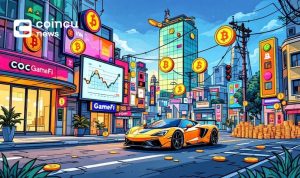This report summarizes and analyzes GameFi industry data first half of 2022, including the performance of the GameFi industry as a whole and on each chain, as well as GameFi token liquidity and GameFi fundraising analysis. It also tracks key data of Axie Infinity and STEPN, the hot GameFi program first half of 2022
Overall GameFi Market Performance
Trend of Total Games
The top 3 chains in terms of number of games are ETH, BNB Chain, and Polygon
The number of GameFi games grew slowly in the first half of 2022, from 1,200 to 1,500, and the head clustering effect is obvious
- ETH: 534 games, still the chain with the most games, but the growth rate is slow, with only 34 games added in the first half of 2022
- BNB Chain: The fastest-growing number of games, from 332 to 477, basically the same as ETH
- Polygon and WAX have also performed well
Trend of Total Gamers
Hive and WAX are alternately leading in the comparison of the number of players, and Starting in June two platforms have a strong downtrend
- Polygon was in rapid decline after a strong start to Q1
- Solana and BNB Chain remained stable in the third and fifth positions
Trend of Total Transactions
No. 2: BNB Chain, $479,111 (12,45%)
No. 3: Harmony, $172,361(4,48%)
- The explosion of DeFi Kingdoms brought a lot of transactions, and the game accounted for 80% of the total trading volume on Harmony
Highlight Events
a16z launched a $600 million fund dedicated to gaming startups to increase bets on Web3 technology
The company’s $600 million funds will target gaming startups in the Web3 and blockchain space. Web3 refers to the next iteration of the tokenized and decentralized internet, unlike the current Web2 version that is dominated and controlled by corporate tech giants.
According to the WSJ, a16z used the example of the billions of dollars in annual revenue that top games such as “Fortnite” and “Minecraft” generate.
“Games infrastructure and technologies will be key building blocks of the metaverse, an opportunity that dwarfs the current $300 billion game industry,”
Axie Infinity’s $650M Ronin Bridge hack
Hackers hacked Ronin Network, the side-chain built to expand Axie Infinity, about a month ago, and made off with almost $615 million in ETH.
Out of the 173,000 ETH taken in the Ronin Bridge assault, the hackers appear to have cashed in 28,164 ETH, with a current market value of $86,128,384.73. Read more
Animoca Brands raises US$358,888,888 at over US$5B valuations to grow the open metaverse
Animoca Brands, the company driving digital property rights via NFTs and gaming to build the open metaverse, today announced that it has completed a capital raise of US$358,888,888 (approximately A$500.3 million) at a pre-money valuation of over US$5 billion.
The new capital will be used to continue funding strategic acquisitions and investments, product development, and licenses for popular intellectual properties. Read more
Spotlight Projects
StepN
STEPN is the first move2earn mobile NFT game powered by Solana where players can walk, jog or run outdoors with an NFT Sneaker to earn tokens. STEPN aims to inspire millions to engage in healthier lifestyles by bringing them into the Web 3.0 world while contributing positively to carbon neutrality.
- STEPN Chief Marketing Officer Shiti Maghani told CoinDesk the app has 800,000 daily active users as of Thursday. In mid-June, STEPN launched DOOAR, allowing those users to provide liquidity in its native tokens – GST/USDC or GMT/USDC pairs.
Issues The Crypto Gaming Industry
Issues plaguing GameFi today can be summarized as either of the following
Lack of actual product
One example was Pixelmon, an open-world Metaverse game inspired by Pokemon. NFT Pokemon where players can battle, trade, and have fun in the Metaverse – sounds great.
Of course, the end result with their actual NFT launch was a massive disappointment, and this picture alone says it all.
Ponzi
Axie Infinity, the first generation of blockchain-based games took the form of card games, allowing players to collect rare cards to battle other players. After each battle batch, players can get resources to “reinvest” in other mechanics in the game, such as increasing the value of their own characters and exchanging them with other players. For a good example, Axie Infinity is the name that is often mentioned first in the field of GameFi.
The number of Axie Infinity players increase dramatically in 2021, and its potential is so great that it will spawn other GameFi communities for a living. Some people earn enough to cover their daily living expenses, and have considered Axie Infinity as their full-time job.
However, games that adopt the morphing GameFi model have turned into Ponzi, and like all other financial-related fields, imagine “the honey from that bargain attracts both bees and flies”. Game products with poor gameplay directly reduce the GameFi value, turning them into slot machines with cheap playing mechanics.
When the developer doesn’t show the desire to reinvest, just work hard to combine with other KOLs scammers, take the money from the latter to pay the former, and conveniently take a large part of the money as their own. Now, games degenerate into betting apps with false promises of wealth. Players become gamblers and don’t directly own a digital item, don’t participate in the blockchain economy born of a true GameFi.
Of course, these issues are not unnoticed by teams, analysts, and the retail market in general for gaming. In fact, I think everyone will agree with this statement below.
“A gaming project in crypto MUST be fun.”
How does this tie in with how a GameFi project is valued? Firstly, if players do not enjoy the gameplay, there can be no organic fanbase for the project and its fate is eventually tied to the token economics side of the project.
When the hype cycle goes away, projects must focus on ensuring players stay in the game for the long run, or they risk exodus like many have seen in older Defi projects. But how? I believe this comes in several forms:
- Levels/Progression:
Provides a goal and journey for players to aim towards. This is obvious of course! Gamers require consistent challenges and many of them enjoy the process of “leveling” up in their ventures.
This is why online games today often have expansion packs or release frequent updates to engage their user base and provide them with further goals to fulfill. It can be in the form of new quests, new maps, etc. But the difficulty lies in how a GameFi project might strive to implement it.
In summary, I believe continuous user gameplay and unique player counts will be a strong indicator of a GameFi project’s success.
- Importance of Sustainable In-Game Currency
The dual token system used by Axie has been replicated by many competitors, but one of the bigger issues lies in the inflation of the secondary in-game currency.
Verdict
The market cap of gaming projects was stable, token liquidity increased, and VCs continued showing significant interest in new projects. Additionally, new use cases in the form of move-to-earn have opened the possibility for more widespread adoption of GameFi. But, User retention and the fight for the attention/mind space of apes in the space is key for any project, GameFi especially so, to survive in the future.
In an emerging market with many competitors popping up every day, GameFi projects that wish to survive will have a long road ahead of them – but I believe that eventually, the victors will still have a legendary bull run awaiting.
If you have any questions, comments, suggestions, or ideas about the project, please email ventures@coincu.com.
DISCLAIMER: The Information on this website is provided as general market commentary, and does not constitute investment advice. We encourage you to do your own research before investing.
Issac
Coincu Ventures



















